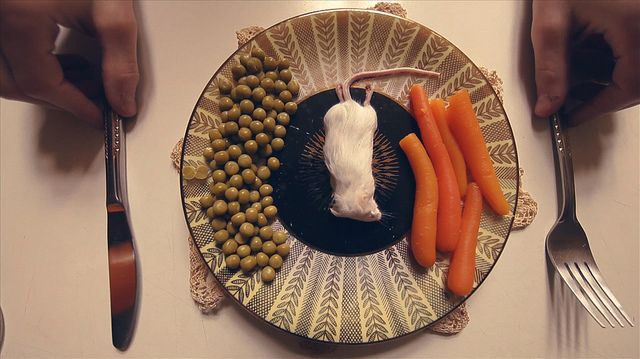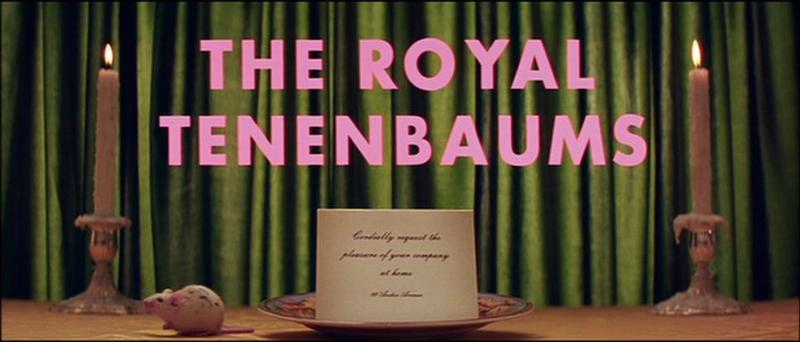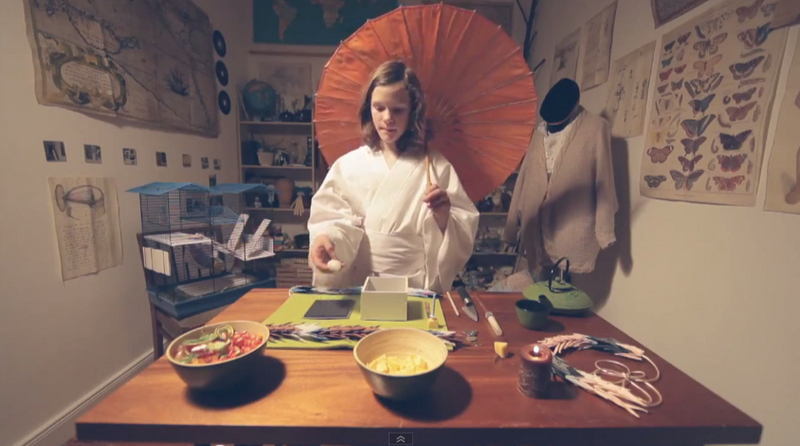In Bryn Chainey’s film for Alcoholic Faith Mission’s song “Legacy,” a young girl deals with the loss of her mouse through a thorough and committed exploration of corpse rites she titles “Death: Anthropological Studies.” Through this study she explores and interprets an eccentric range of funeral rituals, some cultural, some historic, and some made up, like when she explores the pyrotechnic possibility of a “Space Burial.” These rituals are at moments touching, at others funny, and, sometimes harrowing, as in the moment when the “Egyptian Burial” title card appears and brings with it the possibility of a young girl exploring the rather disgusting realities of mummification on her pet mouse. But harrowing and then sweet as she builds a suitable edifice for a mouse’s afterlife, assuming he’s not lactose intolerant.
Though it’s not confirmed, throughout is the sense that this is not her first experience with death. She has after all completed a book on the study. There’s even the possibility that she has lost as many mice as she has explored kinds of funerals rites. But none of that undermines this grief, for this mouse, as she reviews the rites in her book trying to find a satisfactory way to deal with this this loss.
Chainey’s short calls to mind Lynne Stopkewich’s film Kissed (1996) adapted from Barbara Gowdy’s short story “We So Seldom Look On Love,” the story of a young woman erotically obsessed with cadavers.
There the protagonist is fixated not on grief, but on the moment of transformation, from life to something opposite and sublime: “Some say there’s no soul, no afterlife, that life and death is the straightest line on the compass, and nothing more. I say believe what you want, because no matter what you do, cut everything up, burn it all down, you’re in the path of something beyond your control.” For the young girl in “Legacy,” the rites become a way of making meaning from this thing beyond her control.
There’s a Wes Anderson-ish aesthetic at play here with the encyclopedia entry title shots, the hyper organized yet densely populated and layered mise-en-scene, and the variety of askew (Dutch angle) and god’s-eye-view shots of her preparing the deceased mouse for its various rites and rituals. All these choices together persistently remind us that this is fiction, artifice, and that style, to some extent, is the thing here. These stylistic choices embody the girl’s contradictory desires: to express grief, but to do so from a (perhaps more comforting) stylistic distance.
The Wes Anderson-ish aesthetic is perfect for such an exploration, observing and stylized enough to remind us that we are watching art, not something documentary or too real. I tend to prefer this style when Anderson uses it with subject matter that ruptures the distance, like in The Darjeeling Limited, the tale of three brothers in search of their mother as a way of dealing with their loss of their father. When the distance and style rules, in films like his The Royal Tenenbaums, I find that prevents me from experiencing the story on a dramatic level, and instead leaves the audience skipping across the surface of the beauty and style of the piece.
In “Legacy,” this conflict between intellectual distance and emotional experience is key for the young woman seeking to understand her grief for the deceased mouse. In the end she exhausts and then abandons all these possible rituals in favour of exactly what she needs to do to express this grief. As gentle and poignant as her answer is, I find myself still yearning a little for the cheese.
— R. W. Gray





Hmmmm, Rob. Up to your usual macabre standards. I always find it interesting to track my own emotional/physical responses to the films you put up as they scroll by because they do seem to create a response that is physical or emotional and outside the usual and rather conventional response we feel toward a straightforward narrative. And this one, of course, is about DEATH and a mouse (and, man, have I buried a lot of pets through the years of my boys’ growing up. There is, in this one, also, as you say, the strange war between the intellect and the feeling. Which in the end right now seems to be the main poi(gna)nt. The things we do to inoculate ourselves from death and loss, including THINKING about it.
Thanks Robert. I’m Paul the producer of the video and I much appreciate your thoughts and feelings towards our little piece. We made the video with very little means and are delighted by every mark it leaves in the minds and hearts of others. It makes the job worth doing!
Paul, Your feelings are reciprocated. NC is very much directed at the artists themselves as an audience. We always hope they appreciate what we have done. Your comment makes our job worth doing, too. Rob Gray’s NC at the Movies series is rapidly carving out a special niche in the world of film criticism.